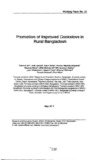Promotion of improved cookstove in rural Bangladesh
Date
2011-05Publisher
BRACAuthor
Arif, TahmidAshraf, Anik
Miller, Grant
Mobarak, Ahmed Mushflq
Akter, Nasima
Ali, ARM Mehrab
Sarkar, MA Quaiyum
Hildemann, Lynn
Dey, Nepal C
Rahman, Mizanur
Dwivedi, Puneet
Wise, Paul
Metadata
Show full item recordCitation
Arif, T., Ashraf, A., Miller, G., Mobarak, A. M., Akter, N., Ali, A. M., … Wise, P. (2011, May). Promotion of improved cookstove in rural Bangladesh. Research Reports (2010): Economic Studies, Vol - XXVII, 190–223.Abstract
This study aimed to explore the factors affecting the promotion of improved
cookstove (ICS) to replace traditional stove and hence to combat indoor air pollution
(lAP). The study was conducted in 58 randomly selected villages of Jamalpur sadar
and Hatia upazilas (29 villages in each) in 2008. Both qualitative and quantitative
methods were used. Focus group discussions were performed in each village to
divide the villages in three equal clusters as well as Paras and listed the opinion
leader of the villages. Fifty randomly selected households and nine households of the
opinion leaders were surveyed in each village. Thus, a total of 3,080 households were
selected for quantitative survey with pre-designed questionnaire. These households
were also offered two types of ICSs - portable and with-chimney under different
experimental conditions. Among those who adopted ICS as was offered usually
chose portable res since they believed this would reduce fuel consumption while
they chose 1es with chimney to reduce pollution. We found that households were
usually aware of lAP but not so much so of the existence of res. But once they came
to know about it through this survey, they would expect ICS to be better than
traditional stoves in producing better tasting food, less smoke emissions, less
cooking and fuel collection time, etc. When compared with those who did not know
about ICS before, prior knowledge on ICS was found to be associated with greater
share of people thinking res was better than traditional in terms of taste of food and
smoke emission. In most cases financial constraints was stated as a reason for not to
adopt an res. The adoption decision was also found to be highly responsive to price.
On the other hand, opinion leaders appeared to have a stronger impact on
households' decisions when the leaders decided against 1es as opposed to when
they decided in its favour. Although this is a very product specific study the results
can provide a guideline to understand similar constraints for many other improved
technologies that exist but are not generally adopted.

